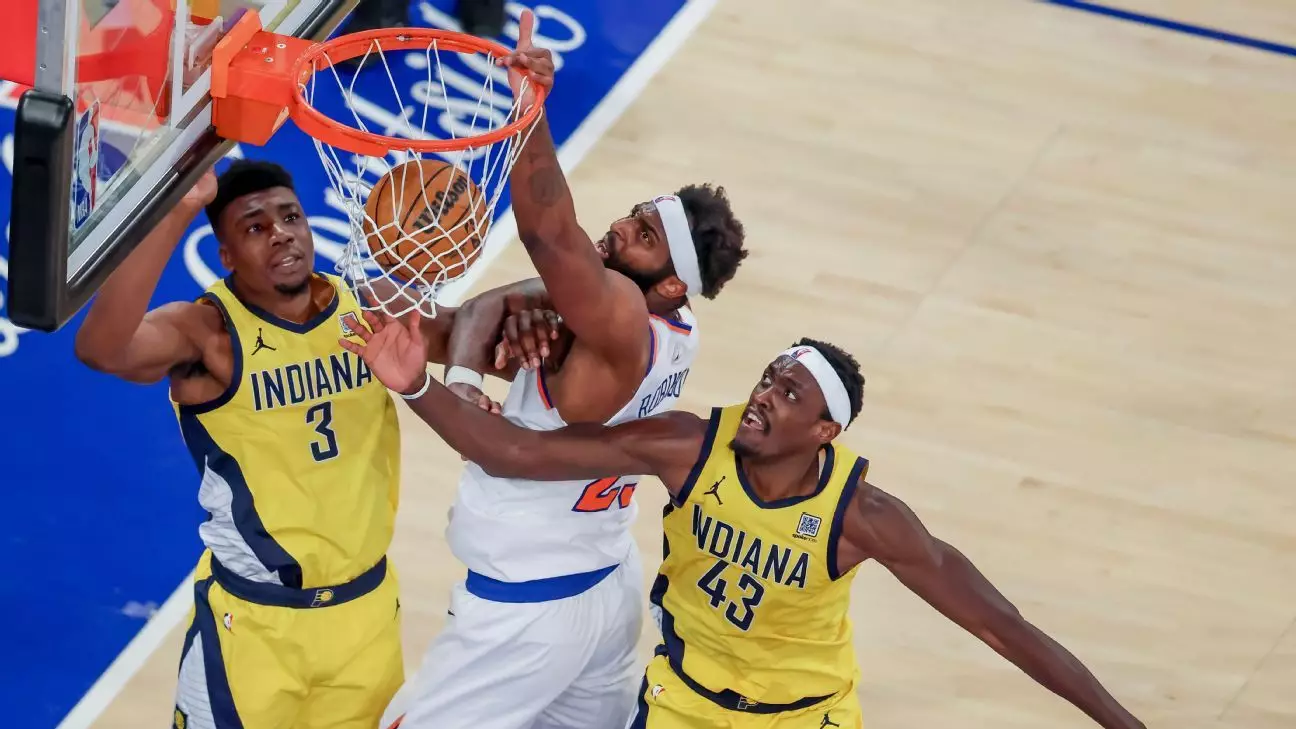In a stunning display of miscalculations and missed opportunities, the Indiana Pacers found themselves drowning in disappointment following a dismal 111-94 defeat at the hands of the New York Knicks. The postseason had promised a grand narrative of hope, grit, and potential triumph; yet, Game 5 unceremoniously slapped that story on the sidewalk and stomped on it, leaving fans and players alike stunned. This wasn’t merely a loss; it was a dissection of what could go wrong when a team lets nerves get the better of them.
On paper, the series still looks favorable, with the Pacers holding a 3-2 lead. However, within the actual game flow, noticeable cracks emerged. The Knicks, driven by desperation, had clearly taken the offensive, while the Pacers struggled to find their footing. This contest should serve as a test of resilience, yet it also exposes vulnerabilities that the Pacers can no longer afford to ignore. It was a rude awakening—an opportunity to reinforce the notion that basketball is as much about mental fortitude as it is about skill.
Tyrese Haliburton’s Struggles Reflect Team’s Ailments
After emerging as a beacon of hope in earlier games, star guard Tyrese Haliburton found himself ensnared in a web of inefficacy, scoring just eight points on a shaky 2-of-7 shooting. As the linchpin of the Pacers’ offense, his struggle revealed the broader limitations of the team’s execution and their need for collective engagement. Basketball is inherently a team sport, and when your star cannot shine, the rest must step up—yet only a handful of players rose to the occasion.
Haliburton’s assertion, “I got to be better, and I’ll be better in Game 6,” holds promise but also highlights the burden that stars often bear within a team structure. Yes, he must improve, but can the rest of the team raise their game as well? The notion that one individual can single-handedly transform a losing momentum is a flawed perspective, yet it looms large when playoff stakes are high. It may be time for the Pacers to rethink their approach—this is not merely Haliburton’s game alone, and reliance on him might crush rather than elevate the team’s prospects.
A Glimpse into the Psychological Landscape
In the aftermath of defeat, players like Aaron Nesmith offered striking insights, emphasizing the need to learn from mistakes. “You get punched in the face like this; sometimes you’ve got to lose to get better,” he remarked. Such candid reflections expose the psychology behind the sport—these players are not merely athletic machines; they are human beings, grappling with expectations and the ruthless nature of competition.
The importance of mental resilience cannot be overstated. As the Pacers gear up for Game 6, their emotional and psychological well-being will be tested. The mantra should be to come back stronger, but that’s easier said than done when the pressure mounts. The veteran leadership, coupled with individual performances, will dictate whether they rise to the occasion or crumble beneath the expectations. Will they channel the adversities of Game 5 as fuel for their fire or fall victim to self-doubt?
The Home Court Advantage: A Double-Edged Sword
Looking ahead, the Pacers will return to their home court, where familiarity can breed both comfort and complacency. While the numbers lean favorably toward the Pacers when considering their overall performance at home, history suggests that nothing is set in stone. Expectations can often weigh heavy, distorting players’ comfort into over-extension and anxiety.
The looming specter of the Knicks may serve as a critical reminder: nothing is guaranteed, particularly in this unpredictable playoff atmosphere. As they prepare for a showdown that will ultimately define their season, Indiana must shun pressure and recognize the moments that tether them to the bond of resilience and vulnerability. Reflecting on aspects like task concentration and dynamic teamwork will be crucial for victory in Game 6.
In summation, the Pacers are poised at a crossroads. With potential to capitalize on lessons learned from adversity, they must weave resilience not just as an outward expression, but as an integral character of their style. How they respond in the next game may not merely determine the fate of their postseason, but could indelibly mark their identity as a squad capable of hope and recovery in the face of overwhelming odds.


Leave a Reply